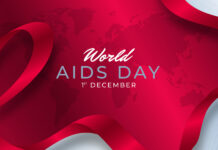This article discusses legal implications that can be associated with bug chasing and gift giving, so it’s important to point out that the author is not a lawyer and does not work in the legal field. The author is also not a doctor or healthcare professional, so as with every article published at this website, it’s important to be aware that this article has been researched using a variety of resources and contains general information that might become out of date, as laws can change. This is being highlighted more so in this article, because this article contains details about legal cases. As all legal issues need to be considered based on their own merits, each case is different, so individual cases cannot be compared to the examples used throughout this article, especially when worldwide laws differ.
Having bareback sex can be a lot of fun and the swapping of bodily fluids is one of the most intense sexual experiences a person can partake in. The exchange of bodily fluids isn’t a neutral experience with just a pleasurable outcome, it can also result in some positive and negative outcomes as well, depending on your viewpoint, such as pregnancy and/or the spread of Sexually Transmitted Infections, including HIV. In most cases, HIV transmission between bug chasers and gift givers involves swapping bodily fluids through anal sexual intercourse (barebacking), but some people prefer other methods of infection, such as blood slamming to provide a more certain outcome. This is how bug chasing and gift giving works in theory, but there’s a lot more that needs to be considered, including the law.
HIV transmission can take place through intentional means, where one or more participants knows what is about to take place, but unintentional transmission can also happen when one or more people are not aware of what’s happening, which can be the result of not knowing a persons HIV status, misleading someone or completely lying about a persons HIV status. The method of transmission can have implications when the law becomes involved, so it’s very important for bug chasers and gift givers alike to know what the law is in their locality before embarking on a journey to infect someone or to become infected by someone. As the law is constantly evolving, particularly where health and medicine is involved, it’s important to remain up-to-date with the legal requirements and this article includes links to an external resource that can be helpful in this regard.
There have been a number of well-known criminal cases around the world involving people who have intentionally transmitted HIV to other people, where the victims were not aware they were about to become infected with the virus. The practice of intentionally lying to someone about HIV status can result in someone being considered reckless according to the law through an action known as stealthing. Because laws for countries can be different and in some countries, individual states have governing rules and powers, it’s impossible for this article to extensively cover the laws for each country and maintain the information accurately in a timely manner. This is why I refer to an excellent resource called the HIV Justice Network, which is a fantastic website containing plenty of useful information that is updated regularly.
The HIV Justice Network regards itself as a global information and advocacy hub that provides a wealth of resources in additional to maintaining their criminalisation database, including videos they have produced, paying particular attention to the laws and how HIV legal cases can be modernised through the use of science. The videos they have produced highlight ending criminalisation now that more is known about the virus, so there can be some protections in place for those who are HIV-positive and there’s a lot of great information designed to educate and share knowledge about HIV from a global perspective too. The whole website is an amazing resource, but their database is the centrepiece, as it’s a powerful feature providing you with information relevant to your own locality.
Global HIV Criminalisation Database
The Global HIV Criminalisation Database consolidates three databases into one resource, with a portal providing updated information and analysis of HIV criminalisation laws, a searchable global database of reported HIV criminalisation cases and a directory of organisations around the world actively working against HIV criminalisation. Explore the Databases: Cases | Laws and Analysis | Organisations
The databases allow you to search and filter your results, so finding what you’re looking for is quick and easy. For example, at the time this article was published, there were 1014 legal cases recorded in the database, but when you choose “gay men”, the number of cases drops to 144. This indicates that a significant number of HIV criminal cases refer to heterosexual intercourse, unless some of the articles have not been tagged correctly, which is an important consideration. A search of “heterosexual men” reveals 429 cases, so there’s definitely more heterosexual cases than homosexual cases, but that still leaves 441 cases that don’t identify a sexuality.
Global Laws Relating to HIV Transmission
The HIV Justice Network includes laws relating to many countries, and this article includes a number of countries where there’s been a significant number of legal cases involving intentional HIV transmission. This information was accurate at the time it was extracted from the Laws and Analysis database, but the data is subject to change, so it’s important to check the database or the laws using a relevant government website or reliable resource to ensure the information is still current.
Many of the successful legal cases around the world relate to non-disclosure, which can result in prosecutions such as assault, injury, bodily harm, endangering life, poisoning, aggravated homicide, common nuisance, criminal negligence, administration of a noxious substance, attempted murder, murder, grievous bodily harm, danger of contagion, endangering the health of another, wounding with intent, wilfully infecting with a disease, serious danger to the physical integrity of another, danger to life, causing disease to another and maliciously transmitting a dangerous communicable human disease.
In numerous countries, the laws have not progressed and remain out of alignment with the significant advances in science, which means charges of attempted homicide or attempted murder are still current laws in some countries, when it’s a scientific fact that becoming infected with HIV is no longer a death sentence for those who have access to antiretroviral medication. Some countries and locations also have criminal codes and public health acts that are completely different to each other. For this reason, it’s important for you to update yourself in terms of any laws relating to HIV transmission in the country you are located in.
You might be wondering what the legal position is when it comes to situations where all parties agree to HIV transmission. This article does not elaborate any further than the information provided by the HIV Justice Network, otherwise this could be seen as providing legal advice, which this website does not provide (nor does it provide medical advice). It’s important to note that the HIV Justice Network only provides information about current legislation and previously prosecuted cases, so you need to act with caution. Legislation can change and the prosecution may make a decision different to some of these case outcomes depending on individual circumstances that apply to each case. For this reason, it’s important to carefully consider any legal aspects associated with intentional HIV transmission, in addition to any health considerations that might also apply.
Australia | At least 39 reported cases
In Australia, each of the eight states and territories have criminal laws which could be applied to people living with HIV. There are no HIV-specific criminal laws in Australia, with the last HIV-specific law repealed in Victoria in 2014. HIV criminalisation cases usually involve use of general criminal laws, including laws of assault, causing injury or bodily harm, and endangering life. Cases relate both to alleged exposure and transmission. No person has been prosecuted under general criminal laws when a condom has been used. All jurisdictions also have public health laws which generally require people to take reasonable precautions to prevent HIV transmission.
Austria | At least 56 reported cases
Austria began prosecuting criminal HIV exposure and transmission in 1990 under existing laws, making it a crime to intentionally or negligently “commit an act likely to cause the danger of spreading a transmissible disease”. Under the law, the disease must be (at least in part) reportable or notifiable. HIV is considered such an infectious disease, along with Hepatitis C, tuberculosis and gonorrhoea.
Belgium | At least 5 reported cases
HIV-related prosecutions in Belgium have used the general criminal law, both for sexual and non-sexual exposure and/or transmission. People with HIV have been prosecuted where their actions may have included possible exposure to HIV, both where transmission has been alleged and where it has not. People have also been prosecuted where it was alleged than an act included a risk of HIV exposure, although the allegation is not supported by science. When the offences have related to sex, prosecutions have been based on an allegation that the accused did not disclose their HIV status before the act in question.
Brazil | At least 35 reported cases
The Penal Code of Brazil includes two general provisions criminalising the spread of venereal diseases and serious illnesses, the latter of which has been used against people living with HIV, along with general bodily harm laws including aggravated homicide. There have been recent attempts to introduce provisions which specifically criminalise HIV transmission, but these attempts have been unsuccessful and there remain no HIV-specific laws.
Canada | At least 234 reported cases
Canada has one of the highest number of reported HIV cases in the world despite there being no HIV-specific law. Most cases have been prosecuted under (aggravated) sexual assault laws although charges of common nuisance, criminal negligence causing bodily harm, administration of a noxious substance, attempted murder and even murder have occasionally been used. Public health law can also be used against people living with HIV who do not disclose their status and/or do not use precautions to prevent HIV, with these orders enforceable through courts.
Czech Republic | At least 19 reported cases
The Czech Republic does not have an HIV-specific criminal law but people have been prosecuted under two sections in the Czech Criminal Code 2009 relating to ‘spreading an infectious disease’. Section 152 criminalises intentional transmission, with a penalty of 6 months to 3 years’ imprisonment, disqualification or forfeiture of items. The sentence can be increased to up to 8 years in certain circumstances including if the act caused grievous bodily harm, and up to 10 years if the act related to more than one person or caused death.
Denmark | At least 20 reported cases
Denmark suspended its HIV-specific criminal law in 2011. Prior to that, the first attempted prosecution for HIV exposure/transmission occurred in 1993, using a charge of ‘wantonly or recklessly endangering life or physical ability’ under the Danish Criminal Code. The case ultimately failed because the Supreme Court found that the wording of the law did not provide a clear legal basis for conviction. Two subsequent cases also failed, prompting the government to introduce a new offence: criminalising exposure to a ‘life-threatening or incurable disease’ (section 252, enacted in 1994).
Finland | At least 21 reported cases
The Finish Criminal Code does not have an HIV-specific provision but other sections of the Code have been applied to cases of HIV exposure and transmission: sections 5 (assault), 6 (aggravated assault), and 13 (imperilment). There is no legal duty to disclose HIV-positive status but notably, there have been no prosecutions to date where a person is known to have disclosed HIV-positive status before unprotected sex. Both negligent and ‘intentional’ exposure and transmission have been criminalised.
France | At least 43 reported cases
HIV-related prosecutions in France previously used the law relating to ‘poisoning’ but now use the law relating to the ‘administration of harmful substances’. There have been at least 40 HIV criminalisation cases in France with the first known prosecution reported in 1998 with all cases based on the allegation that the accused did not disclose their HIV status before the act in question. All prosecutions have related to alleged HIV transmission related to sexual acts, with charges of exposure only applied as additional charges when the person had been charged concurrently with alleged transmission.
Germany | At least 55 reported cases
Prosecutions for HIV exposure and transmission in Germany are based on existing bodily injury and aggravated assault laws, following a Federal Supreme Court decision in 1988 that unprotected sex without disclosure was attempted bodily injury. Prosecutions have been based on general criminal or similar laws and have all related to perceived risk of HIV transmission associated with sexual acts, including acts relating to sex work.
Greece | At least 34 reported cases
Greece does not have an HIV-specific provision but other laws in the Penal Code may be applied, for example, causing bodily harm/injury (sections 308 to 314). At least thirty four people have been prosecuted in relation to HIV.
India | At least 15 reported cases
India has no HIV-specific law but the Indian Penal Code has two provisions which may be used to address exposure to an illness or disease, including HIV. Section 269 states that unlawfully or negligently undertaking an act likely to spread an infection dangerous to life is punishable by six months imprisonment and/or a fine. Section 270 increases the penalty to up to two years and/or a fine when the act is a ‘malignant act’. In both cases, the offence includes not only a person knowing the act is likely to transmit an infection, but also having ‘reason to believe’ the act is likely to transmit an infection; effectively lowering the threshold for a charge to be laid.
Ireland | At least 6 reported cases
Ireland does not have an HIV-specific law, but a number of general criminal laws have been used to respond to cases involving HIV transmission risk.
Italy | At least 16 reported cases
Italy does not have an HIV-specific law, but there have been at least 16 prosecutions for alleged HIV exposure or transmission using laws relating to causing bodily harm. Italy is also believed to be the first country in the world to find someone living with HIV guilty of murder for HIV transmission, when an Italian man was found guilty of culpable homicide in 2000, and sentenced to 14 years in prison for transmitting HIV to his wife, who subsequently died. Case law has established that non-disclosure before condomless sex is considered a dolus eventualis (indirect intention), which is a similar standard of culpability as “recklessness” in common law systems.
Mexico | At least 20 reported cases
Mexico is a republic consisting of 32 jurisdictions. There is both a federal law and individual state laws, each with their own criminal provisions. The federal law and almost all states, with the exception of Aguascalientes and San Luis Potosí, maintain provisions which have the potential to criminalise those living with HIV, predominately through the criminalisation of perceived ‘exposure’ to diseases. The most common formulations of this type found within Mexican criminal codes are perceived ‘danger of contagion’ and ‘endangering the health of another’. Only two of these criminalising states, Coahuila and Tamaulipas, make explicit mention of HIV/AIDS within the relevant provisions. The remainder criminalise perceived ‘exposure’ to diseases generally, most frequently referencing ‘venereal diseases’, ‘serious illnesses’, or ‘serious transmissible diseases’.
Netherlands | At least 18 reported cases
The Netherlands became one of the first countries in the world to apply the science of HIV to the criminal law, essentially decriminalising everything except intentional HIV exposure or transmission. Prior to this, between 1989 and 2005, there were at least 15 convictions for alleged HIV exposure or transmission using laws relating to assault, causing bodily harm and manslaughter.
New Zealand | At least 14 reported cases
New Zealand’s HIV criminalisation cases have been based on general criminal laws, with 14 prosecutions known to have occurred, with the first case reported in 1993. All defendants have been male, with guilty verdicts recorded in 10 cases (although one person died before their case was decided). Charges include ‘criminal nuisance ‘(maximum sentence of one year), ‘wounding with intent’ (seven years), ‘wilfully infecting with a disease’ (14 years), and “duty of persons in charge of dangerous things” (no specific sentence attached). These men have been charged in cases of possible HIV exposure (no transmission alleged) and alleged HIV transmission. All cases involving sex have been based on the allegation that the accused did not disclose his HIV-positive status before sex.
Norway | At least 16 reported cases
Despite not having an HIV-specific criminal law, Norway has a long history of prosecutions for HIV non-disclosure, exposure or transmission, being one of the highest per-capita prosecuting jurisdictions in the world. At least 16 people are known to have been prosecuted between 1992 and 2017, including six cases where HIV was not transmitted. All prosecutions resulted in conviction, although one case was overturned on appeal and sent for retrial. Sentences have been for up to five years imprisonment. The 2017 changes to the Penal Code have now greatly limited circumstances in which people can be prosecuted.
Portugal | At least 4 reported cases
There is no HIV-specific criminal law in Portugal, however the Penal Code contains general provisions which have been used to criminalise the transmission of HIV on at least four occasions. In particular, Article 283 of the Penal Code criminalises the spread of contagious diseases in a way which creates a ‘danger to life’ or a ‘serious danger to the physical integrity of another’, with a penalty of one to eight years’ imprisonment, or lower in the case of negligence. Additionally, the offences against physical integrity under Chapter III of the Penal Code have been used to criminalise the transmission of HIV.
Singapore | At least 10 reported cases
There have been at least 10 HIV criminalisation cases in Singapore, with the first known case occurring in 2008. The majority of cases to date have applied section 23 of the Infectious Diseases Act, which is an HIV-specific provision. In most cases, the accused (all of them men) have pled guilty. The Infectious Diseases Act states that a person who knows they have HIV or has reason to believe they have been exposed to a significant risk of acquiring HIV, must not engage in any sexual activity with another person without informing the person that they have (or may have) HIV. The person living with HIV must also tell their prospective partner of the risk of contracting HIV before the sexual activity takes place. The law then acknowledges that if both actions occur, a sexual partner may voluntarily agree to the risk.
Spain | At least 21 reported cases
Spain does not have an HIV-specific law, but people have been prosecuted or sued in both criminal and civil law systems in cases where HIV exposure or transmission has been alleged. Conviction under the criminal law can result in a prison sentence and having to pay economic compensation (while under civil law, only economic compensation can result). Cases have generally been prosecuted under the Criminal Code using articles related to causing injury: bodily harm (147), grievous bodily harm (149), reckless bodily harm (152), and at least one case of reckless homicide (142).
Sweden | At least 61 reported cases
Despite not having an HIV-specific law, Sweden has prosecuted more than 60 people living with HIV since 1987 using a range of laws contained in the Swedish Criminal Code, including causing danger to another, causing disease to another (aggravated), attempted aggravated assault, and aggravated assault. Sweden’s Communicable Disease Act also mandates disclosure of HIV-positive status before any kind of sex, although this has been modified recently to preclude people on effective treatment.
Switzerland | At least 73 reported cases
Despite not having an HIV-specific criminal law, Switzerland has one of the highest rates of HIV criminalisation in Europe, with more than 70 cases of prosecutions for HIV non-disclosure, exposure or transmission since the first prosecution took place in 1988. The majority of defendants have been men and the great majority of prosecutions have related to heterosexual sex. A majority of these cases were prosecuted under Article 231, “maliciously transmitting a dangerous communicable human disease” of the Swiss Criminal Code, sometimes alongside Articles 122 and 125. Since 1999, HIV exposure (without transmission) has been treated as a failed attempt to transmit HIV under both Articles 122/125, and remains punishable. The law of common assault or assault through negligence can also be used, although they have been rarely applied to HIV-related cases.
United Kingdom | At least 48 reported cases
Prosecutions in the United Kingdom take place under existing assault laws. These are similar for England and Wales (one legal jurisdiction) and for Northern Ireland, where reckless HIV/STI transmission or intentional HIV/STI exposure or transmission can be prosecuted under grievous bodily harm laws. Although these laws can apply to any serious sexually transmitted infection, and there have been cases related to hepatitis B, herpes and gonorrhoea, the vast majority of criminal cases have been HIV-related. Scotland applies its own assault law – the common law offence of culpable and reckless conduct – to either reckless HIV exposure or transmission.
United States | At least 2927 reported cases
The United States of America is believed to be the first country in the world to prosecute people living with HIV and to enact HIV-specific criminal laws, commencing in 1986/7. Each US state and territory – as well as the US military – treats alleged HIV non-disclosure, potential or perceived exposure and/or alleged transmission, differently.
In many of the cases that have been successfully prosecuted around the world, it was because someone involved in the sexual encounter was not aware of what was happening. I have explored the database and I have been unable to find any cases where prosecutions took place where all parties involved knew about the HIV transmission. The cases often involved someone who was secretly infecting someone, where one person knew their HIV status, but they did not reveal their status to the other person beforehand. This is where complaints are then made, when someone becomes infected against their knowledge, which is likely how these cases become known to the authorities.
This article is purely to make you aware of the legal aspects that can be associated with intentionally transmitting HIV to another person. You need to protect yourself by making yourself aware of the relevant laws, so you can make informed decisions about whether you want to transmit the virus to another person. Having conversations with anyone involved and disclosing your HIV status is important, because it means you have been open and the law may be willing to take this into consideration if a problem arises. The type of conversation is also something you need to think about, because a verbal conversation could be questioned if there’s a disagreement further down the track about what was said, so conversations on via text message, email, hookup messages or social media messages might be helpful in these situations to demonstrate that everyone involved knew the risks and was agreement with the potential outcome.
Featured Photo: lechenie-narkomanii from Pixabay.
Article ID: CC035
Version Control: 1.0 – April 16, 2022: Original article published.







